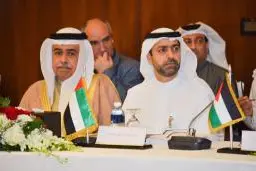PHOTO
With the participation of IMF and WBG
Abu Dhabi: The Undersecretaries' of the Arab Ministries of Finance's first meeting kicked off today in UAE Capital, Abu Dhabi. The meeting, which was organised by the UAE Ministry of Finance (MoF) in cooperation with the Arab Monetary Fund (AMF), witnessed a large participation from undersecretaries and directors of Arab Ministries of Finance. The meeting was headed by HE Dr. Sulaiman bin Mohammed Al Turki, Undersecretary of the Saudi Ministry of Finance for International Financial Affairs.
The meeting covered a number of topics on the main economic issues in the Arab region; including financial policy coordination between Arab countries, economic, regional and international challenges and future steps to support economic growth in Arab countries, as well as strengthen investment opportunities. The Undersecretaries' recommendations will be discussed the forthcoming meeting of the Council the Arab Ministers of Finance, which will be held in Bahrain in April 2016.
Commenting on the meeting, HE Younis Haji Al Khoori, Undersecretary of MoF, said: "The UAE, represented by MoF, is committed to strengthen ties and joint financial work between Arab countries; as part of the country's strategic direction on supporting the economic and social development projects, strengthening opportunities for exchange of experiences and develop the mechanisms of government fiscal work in the Arab region."
HE Al Khoori highlighted that this meeting is significant as it is attended by the International Monetary Fund (IMF) and World Bank Group (WBG). Experts from the participating entities will present a number of working papers prepared to study the economic, development and social status of the Arab region, and shed light on ways of enhancing job creation and poverty reduction.
During the first and second session of the meeting, IMF officials presented; two working papers on. "Economic Diversification in Oil-Exporting Arab Countries" and "Investment and Growth in the Arab World: A Scoping Note".
The first working paper covered all different types and mechanisms of economic diversification, the necessary conditions for economic diversification, as well as suggesting a road map for a greater diversification in these countries. The second paper covered the current investments situation in Arab countries, along with the key challenges that may face investments. The second paper also emphasised the impact of lower oil prices on exporters and importers and the normalisation of U.S. monetary policy, on Arab countries.
The World Bank Group (WBG) presented a working paper titled "Enhancing flexibility of labor market for job creation in the Arab region". The paper provided types of labor regulations in the Arab region, and the importance of reforming the adopted work mechanisms to lower labor costs and help reduce unemployment. The working paper also suggested a number of mechanisms to support the reform process, which included aligning labor regulations with international standards; as well as reduce discretion in the setting of minimum wages, and reduce the gap between men and women minimum wages. WBG also discussed topics on improving the quality of linking subsidies and general revenues, reducing the tax wedge and conduct national social dialogue over labor market reforms.
The final session of the first day of the meeting discussed another working paper titled "Experiences in integrating the informal sector into the economy", which was presented by the World Bank Group. The paper highlighted the primary motive for studying informal economic activity in terms of the size and importance of the sector, its role in job creation and employment for disadvantaged groups and in productivity and growth. It also included recommendations to adopt a timeline and action plan to carry out research that supports regulatory entities' ability to and implement policies that assist small informal firms to improve their performances.
The undersecretaries of Arab Ministries of Finance will resume their meeting tomorrow, Thursday, January 14th. The second day will cover elements including the exchange of experiences on tax policies and reforms in the Arab countries, and the latest on the preparations for the forthcoming Arab Fiscal Forum. Undersecretaries will also discuss UAE's initiative to support the development of Arab countries, and preparations for the forthcoming Meeting of the Council of the Arab Ministers of Finance which will be held in Bahrain in April 2016.
-Ends-
For more information:
Osama Dagamseh / Mirna Hammoud / Mira Assaf
Weber Shandwick
Phone: +971 55 744 3346 / + 971 56 3710116 / +971 50 3123518
Fax: + 971 2 449 4833
Email: odagamseh@webershandwick.com; mhammoud@webershandwick.com ; massaf@webershandwick.com;
© Press Release 2016




















